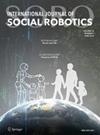为老年人设计多模态会话代理:一项参与式设计研究
IF 3.8
2区 计算机科学
Q2 ROBOTICS
引用次数: 0
摘要
会话代理(CA)越来越多地用于管理和协调家务和日常家庭活动。但是,这些技术应适应特定年龄的特点,以便被认为对老龄人口有益。本研究提出了一种参与式对话代理设计,为65岁及以上的成年人提供食谱遵循和营养建议方面的认知支持。通过定性专题分析,本研究探讨了老年人与代理的期望、互动和经验,以确定与ca互动的年龄特异性挑战。数据包括与8名老年人(65岁及以上)的参与式设计研讨会,随后是绿野仙踪研究,其中10名老年人在实验室设置的厨房环境中与代理互动。结果表明,老年人认为对话代理有助于提供个性化的食谱建议,建议用户选择合适的食材,并提醒他们的饮食摄入量。在与代理人互动时,老年人表现出确认和重复、质疑和纠正、缺乏会话反应以及听力和理解多模态互动方面的困难。老年人将代理人视为合作者,而不是对话伙伴。该研究认为,通过进一步开发老年人的参与性方法,可以提高语音交互对话代理的可访问性和包容性。本文章由计算机程序翻译,如有差异,请以英文原文为准。

Designing Multi-Modal Conversational Agents for the Kitchen with Older Adults: A Participatory Design Study
Abstract Conversational agents (CA) are increasingly used to manage and coordinate household chores and everyday activities at home. However, these technologies should be adaptive to age-specific characteristics in order to be considered beneficial for the ageing population. This study presents a participatory design of a conversational agent to provide cognitive support in recipe following and nutrition advice for adults aged 65 and over. Through a qualitative thematic analysis, the study explores older adults’ expectations, interactions and experiences with the agent in order to identify age-specific challenges of interacting with CAs. Data consists of a participatory design workshop with eight older adults (aged 65 and over), followed by a Wizard of Oz study with ten older adults interacting with the agent in the kitchen environment in a laboratory setting. Results demonstrate that older adults consider conversational agents as beneficial for providing personalised recipe recommendations, advising the user to choose appropriate ingredients and reminding them of their dietary intake. When interacting with the agent older adults displayed challenges with confirmation and repetition, questioning and correcting, the lack of conversational responses, and difficulties in hearing and understanding the multi-modal interaction. Older adults experience agents as collaborators, but not as conversational partners. The study concludes that the accessibility and inclusiveness of conversational agents regarding voice interaction could be improved by further developing participatory methods with older adults.
求助全文
通过发布文献求助,成功后即可免费获取论文全文。
去求助
来源期刊

International Journal of Social Robotics
ROBOTICS-
CiteScore
9.80
自引率
8.50%
发文量
95
期刊介绍:
Social Robotics is the study of robots that are able to interact and communicate among themselves, with humans, and with the environment, within the social and cultural structure attached to its role. The journal covers a broad spectrum of topics related to the latest technologies, new research results and developments in the area of social robotics on all levels, from developments in core enabling technologies to system integration, aesthetic design, applications and social implications. It provides a platform for like-minded researchers to present their findings and latest developments in social robotics, covering relevant advances in engineering, computing, arts and social sciences.
The journal publishes original, peer reviewed articles and contributions on innovative ideas and concepts, new discoveries and improvements, as well as novel applications, by leading researchers and developers regarding the latest fundamental advances in the core technologies that form the backbone of social robotics, distinguished developmental projects in the area, as well as seminal works in aesthetic design, ethics and philosophy, studies on social impact and influence, pertaining to social robotics.
 求助内容:
求助内容: 应助结果提醒方式:
应助结果提醒方式:


